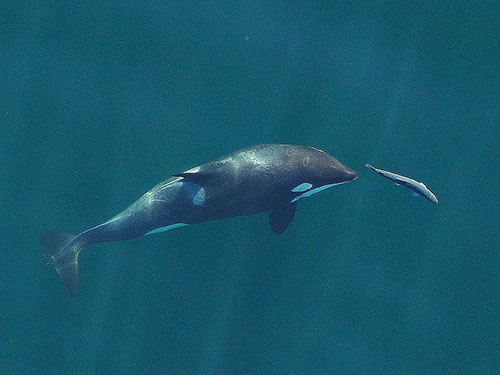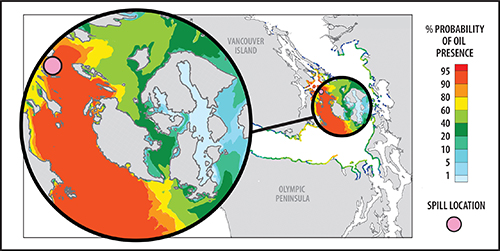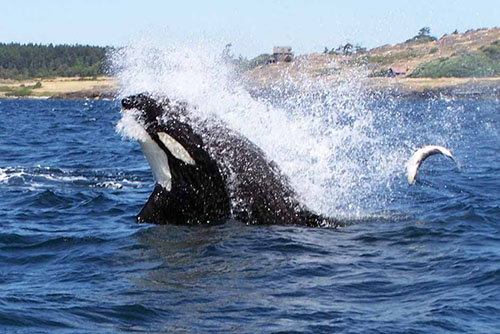— from Janet Alderton and Michael Riordan —

Photo by John Durban/NOAA Southwest Fisheries Science Center
Despite overwhelming opposition from British Columbia, Washington state, and tribes, cities and counties on both sides of the border, plus strong evidence that the Trans Mountain Pipeline Expansion Project will inevitably harm the endangered Southern Resident Killer Whale population, the Canadian National Energy Board has recommended that the project should proceed. This is a deeply flawed decision.
Of paramount concern to San Juan Islanders are the adverse impacts on the struggling orcas, whose wild population is now down to 74 members — the lowest level in decades. If this project is completed as planned, an additional 590,000 barrels of Canadian crude oils would be shipped daily from a Burnaby, BC, terminal; this would result in a seven-fold increase in tanker traffic to more than 800 transits per year through the orcas’ critical habitat in and around Haro Strait.
The additional underwater noise from hundreds more tankers annually will be difficult if not impossible to mitigate. The increased noise would further obscure their favorite prey, Chinook salmon, which the orca whales track and find using echolocation. And the tugboats necessarily accompanying these tankers for safety reasons would ironically generate even more underwater noise.

Computer simulation of the impacts of a major oil spill at Turn Point in Haro Strait.
If there’s a major oil spill in the Salish Sea from one of these tankers, the impact on the orcas will be devastating, possibly wiping out the species. The “clean up” of conventional, floating oils is a widespread myth, as their recovery level is 20 percent at best. Not only could such a large spill in Haro Strait coat our shores and tidelands. If the tanker carries diluted bitumen from tar-sands deposits in Alberta, a sizable portion of it could also separate and sink to the sea floor under conditions of high winds and waves — smothering benthic species there, including the Pacific sand lance that are a prey of Chinook salmon.
So why does the Canadian government want to push forward with this ill-considered project in the face of such overwhelming opposition and evidence? It’s because the Trans Mountain pipeline is the only option left to get Alberta tar-sands crude oil to tidewaters, where it could then be shipped overseas and purportedly earn higher profits. Two other such pipelines have been cancelled, and the federal government bought up the existing Trans Mountain pipeline for CA$4.5 billion.

Photo Courtesy of Spirit of Orcas Whale Watching and Wildlife Tours
But the likely government decision to expand this pipeline is based on deeply flawed economic analysis. The demand for high-sulfur tar-sands crude is projected to drop when the International Maritime Organization’s global pollution standards change in less than a year. All large commercial vessels must significantly reduce their sulfur emissions by January 1, and most of them will do that by switching to low-sulfur fuels rather than the high-sulfur bunker fuels currently used. Because Albertan tar-sands crudes have among the highest sulfur contents in the world, which makes refining them costly, the market for them is likely to plummet.
In that case, all the added pipeline capacity will be for nought. And Canadian citizens will be left holding the bag, wondering how they ever got snookered into wasting billions on such an economic dinosaur.
Janet Alderton is President of the Friends of the San Juans, and Michael Riordan is a former member of its Board of Directors.
**If you are reading theOrcasonian for free, thank your fellow islanders. If you would like to support theOrcasonian CLICK HERE to set your modestly-priced, voluntary subscription. Otherwise, no worries; we’re happy to share with you.**







Can somebody sue somebody to stop it?
And into the Courts this will proceed. Our Salish Sea deserves every chance.
Today I received an email from Trans Mountain (yes, I’m on their list because I was a commenter the first time around when we tried to convince the NEB to disallow this Kinder Morgan pipeline.) Their argument today was about justifying that THEIR tanker traffic makes up only a small portion of vessel traffic in the Salish Sea… Because… gosh darn all those ferries!
All it takes is one “leak” or worse, one major spill. They’ve also just rebranded themselves as Trans Mountain Corporation (LLC, no doubt)
https://www.transmountain.com/news/2019/tankers-are-a-small-portion-of-overall-vessel-traffic-in-the-salish-sea
So who pays when something does go wrong? Kinder Morgan doesn’t pay any liability if something should go wrong with the pipeline; the Canadian Trans Mountain pays all costs. But Trudeau will likely renege on this and it will fall on the people, Canadian and U.S.
What can we do? I hope this is not the end of the fight to save our coasts and SRKWs! Yes to the idea of taking it to the courts again and again if need be.